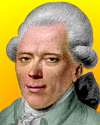 (source)
(source)
|
Georg Christoph Lichtenberg
(1 Jul 1742 - 24 Feb 1799)
German physicist and writer most widely known for his satire and aphorisms, but as a scientist, Lichtenberg did research in a wide variety of fields, including geophysics, volcanology, meteorology, chemistry, astronomy, mathematics, but especially physics. He discovered the basic physical process later used in xerographic copiers.
|
Georg Christoph Lichtenberg Quotes on Thinking (5 quotes)
>> Click for 73 Science Quotes by Georg Christoph Lichtenberg
>> Click for Georg Christoph Lichtenberg Quotes on | Belief | Discovery | Genius | Man | Nature | Science | Theory | Truth | World |
>> Click for 73 Science Quotes by Georg Christoph Lichtenberg
>> Click for Georg Christoph Lichtenberg Quotes on | Belief | Discovery | Genius | Man | Nature | Science | Theory | Truth | World |
Non cogitant, ergo non sunt.
[They do not think, therefore they are not.]
[They do not think, therefore they are not.]
— Georg Christoph Lichtenberg
Aphorism 61 in Notebook J (1789-1793), as translated by R. J. Hollingdale in Aphorisms (1990). Reprinted as The Waste Books (2000), 140. (Compare René Descartes, “Cogito ergo sum”—I think, therefore I am (1637).]
Do not say hypothesis, and even less theory: say way of thinking.
— Georg Christoph Lichtenberg
Aphorism 263 in Notebook J (1789-1793), as translated by R. J. Hollingdale in Aphorisms (1990). Reprinted as The Waste Books (2000), 181.
He had constructed for himself a certain system which thereafter exercised such an influence on his way of thinking that those who observed him always saw his judgment walking a few steps in front of his feeling, though he himself believed it was keeping to the rear.
— Georg Christoph Lichtenberg
Aphorism 82 in Notebook D (1773-1775), as translated by R.J. Hollingdale in Aphorisms (1990). Reprinted as The Waste Books (2000), 56-57.
That is as natural to man as thinking or throwing snowballs.
— Georg Christoph Lichtenberg
Aphorism 18 in Notebook C (1772-1773), as translated by R.J. Hollingdale in Aphorisms (1990). Reprinted as The Waste Books (2000), 34.
The more experiences and experiments accumulate in the exploration of nature, the more precarious the theories become. But it is not always good to discard them immediately on this account. For every hypothesis which once was sound was useful for thinking of previous phenomena in the proper interrelations and for keeping them in context. We ought to set down contradictory experiences separately, until enough have accumulated to make building a new structure worthwhile.
— Georg Christoph Lichtenberg
Lichtenberg: Aphorisms & Letters (1969), 61.
See also:
- 1 Jul - short biography, births, deaths and events on date of Lichtenberg's birth.



 In science it often happens that scientists say, 'You know that's a really good argument; my position is mistaken,' and then they would actually change their minds and you never hear that old view from them again. They really do it. It doesn't happen as often as it should, because scientists are human and change is sometimes painful. But it happens every day. I cannot recall the last time something like that happened in politics or religion.
(1987) --
In science it often happens that scientists say, 'You know that's a really good argument; my position is mistaken,' and then they would actually change their minds and you never hear that old view from them again. They really do it. It doesn't happen as often as it should, because scientists are human and change is sometimes painful. But it happens every day. I cannot recall the last time something like that happened in politics or religion.
(1987) -- 


